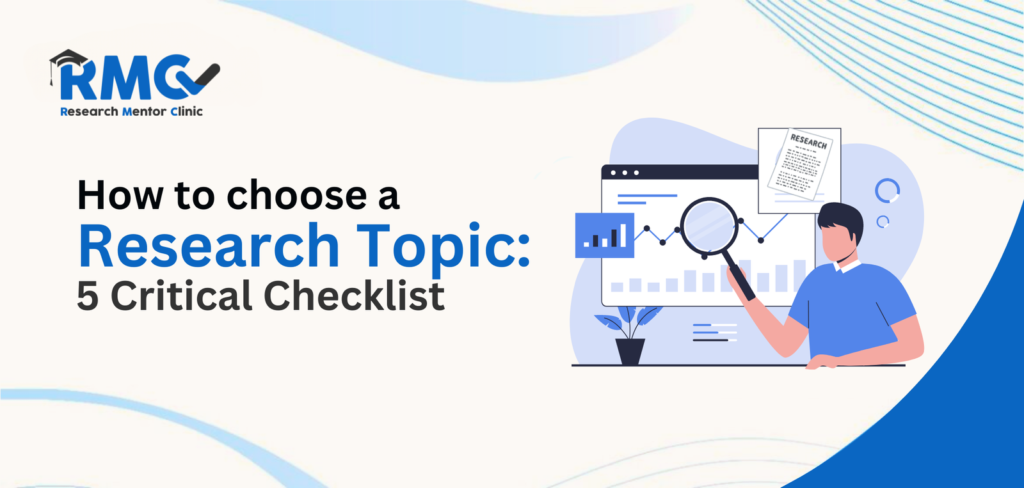HOW TO CHOOSE A RESEARCH TOPIC: 5 CRITICAL CHECKLIST

How to choose a Research Topic: 5 Critical Checklist🤷
What Is A Good Research Topic For Dissertation Or Thesis Writing? Choosing the right one requires systematically evaluating your ideas against the same criteria. In this blog, we will unpack 5 key checklist points that will help you assess likely candidates for an idea you would like to study.
Why It Is Important 🎓
Choosing the right research topic is absolutely important since that is the bedrock of your Thesis. A carefully considered topic ensures that your research is relevant, original, and doable. Hence, you will be apt for the topic and add a good deal to the literature. Beyond that, it continually keeps you energised as you research since you will in all propensity.
5 Key Checklist to Choose the Best Research Topic ✅
Identify Interests and Strengths
First, take the time to think about your own strengths and interests. If you do choose a topic that excites you, it will enable you to stay motivated throughout the whole research project.
Ask yourself:
- What subjects am I passionate about?
- What strengths and expertise do I possess in my field?
- How can I leverage my interests and skills in my research?
Conduct Preliminary Research
Once you have a list of potential topics, conduct preliminary research to understand the current state of knowledge in those areas. This helps you identify gaps and areas needing further exploration.
Consider:
- What has already been researched?
- Are there any existing gaps or conflicting findings?
- Is there enough literature to support your research?
Engage with Advisors and Mentors
Discuss your ideas with advisors and mentors who have experience in your field. They will share valuable feedback that can give you a better idea of your topic’s scope and how it can be improvised.!
Ask them:
- What do they think about the originality and relevance of your topic?
- Do they foresee any challenges in pursuing this topic?
- Can they suggest any improvements or additional angles?
Define Objectives
Clearly define the objectives of your research. Specific, measurable objectives will guide your study and keep it focused.
Consider:
- What specific questions do you want to answer?
- What are the expected outcomes of your research?
- How will these outcomes contribute to your field?
Evaluate Feasibility
Evaluate the feasibility of each potential topic. Ensure you have access to the necessary resources and data.
Consider:
- Can you access the sample of interest (e.g., people, animals, etc.)?
- Do you have the required equipment and resources?
- Are there any costs associated with the research, and can you cover them?
Refine and Finalise
After evaluating all aspects, refine your topic based on feedback and further reflection. Make necessary adjustments for clarity and impact.
Ensure your topic:
- Is clear and concise
- Meets all academic and ethical requirements
- Aligns with your long-term goals and interests
Conclusion🤷🏻
Choosing a research topic involves a systematic approach and careful consideration of various factors. By following the steps outlined in this blog post, you can select a topic that is original, significant, feasible, and aligned with your personal and professional goals.
FAQs
- What if I am interested in multiple research topics?
Ans. It’s common to have multiple interests. Conduct preliminary research and discuss with advisors to narrow down your options to the most feasible and impactful topic. - How do I know if my research topic is original?
Ans. Review the literature as thoroughly as other reports have suggested to locate what is unknown in the field. If you have any doubts, it is better to consult scholars in a particular domain to ensure that your topic is still new in the space. - What if I face challenges accessing research data?
Ans. Consider alternative data sources or modify your research design. Seek advice from your mentors and look for collaborations that provide access to necessary data. - How important is it to align my research topic with current trends?
Ans. Aligning your topic with current trends ensures its relevance and increases the likelihood of making a significant contribution to the field. However, ensure it also aligns with your interests and strengths. - What should I do if my research topic involves ethical issues?
Ans. Familiarize yourself with your institution’s ethics policy and seek necessary approvals. Ensure your research adheres to ethical standards to avoid any issues down the line.

